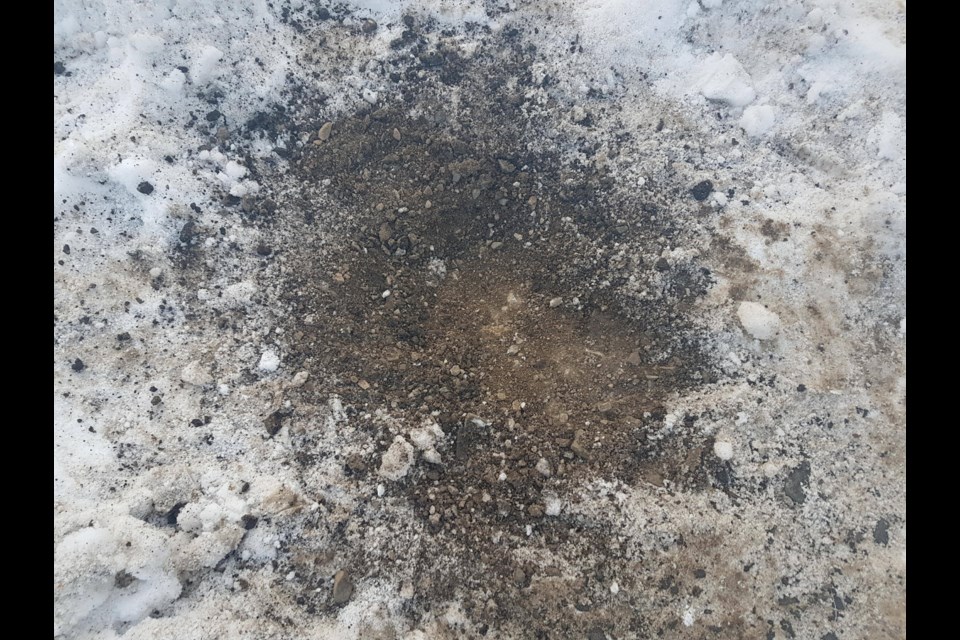THUNDER BAY - The possibility of a meteorite striking the ground along the side of a highway just south of the city has a lot of people buzzing with excitement. But this extremely rare occurrence might just be too out-of-this world to be true.
Brendon Roy, president of the Thunder Bay Centre of the Royal Astronomical Society of Canada, said he was really excited when he first heard of the possible meteorite strike.
“It would be awesome to see a meteorite come in Thunder Bay and something produced by the Geminids would be an extremely rare event have very important scientific value,” he said.
Last Wednesday at approximately 11 p.m., residents in the area of Highway 61 and Mount Forest Boulevard reported hearing a loud explosion that shook nearby houses. What appeared to be an impact crater on the side of the highway was later found by police and fragments were collected that are now being examined by a geology professor at Lakehead University.
However, these impact events are extremely rare, and there are a few key pieces of the puzzle still missing, which leads Roy to believe that a meteorite did not touch down in the north.
According to Roy, meteor showers like the Geminids Shower don’t usually produce meteorite impacts. Furthermore, the fact that a supposed impact crater was found right on the side of a major highway seemed almost too good to be true.
But the biggest missing piece is one that should have been the easiest to find - a bright light in the sky.
“What we are looking for is to see a fireball,” Roy said. “From the astronomer’s perspective, when we hear about a meteorite we would expect to hear lots of stories about a bright shooting star over the night sky. In this case, something that produces a meteorite we could expect to be something five to six times brighter than the full moon.”
So far, only one person has come forward claiming to have seen a flash of light, but there is no video footage showing flashes of light in the sky, which Roy said would have been seen right across the city and beyond.
“All those things together led us to believe this wasn’t in fact a meteor strike at this point in time,” Roy continued. “We are looking for more evidence, so if people do have observations, check your video cameras, there will be a bright flash of light. If you do have something, maybe we can pin down that this was a meteor strike.”
As for the explosion, which shook houses in the area, Roy said a meteorite strike or an airburst could be responsible. Meteorites produce an extremely loud sound, and airbursts have even been known to shatter windows, but Roy still expects a meteorite strike to have produced something even louder.
“Something of that magnitude, you would expect a larger area to hear it, a lot more people,” he said. “And being close to the Nor'westers [Mountains] you might expect to hear an echo off the Nor'westers, so you would get reports of a big bang, and then someone would hear a secondary bang. So it sounds like to me like it was a localized event.”
Lakehead University geology professor, Stephen Kissin, is examining fragments collected from the crater alongside Highway 61 and he expects to have more definitive results in the coming weeks. However, Roy said given the missing pieces to this scientific mystery, it is a bit of an uphill climb.
“What we are looking for is some extremely rare isotope or some other chemical that could not possibly come from anywhere else but from space,” Roy said.
Whether or not Thunder Bay was visited by something from beyond this world still remains a mystery. But Roy said that is part of the fun of science, trying to get to the bottom of these mysteries, and he said the people of Thunder Bay can play a role in solving it.
“If you get the chance over the Christmas break, go do a meteorite hunt, go in the surrounding area and see if you can find some rocks,” he said. “Check your video footage, because if we do get more evidence we can pinpoint one way or the other if this was or wasn’t in fact a meteorite strike.”
If you have any information about the possible meteorite strike, contact the Royal Astronomical Society of Canada by visiting their website, or email them at [email protected].
